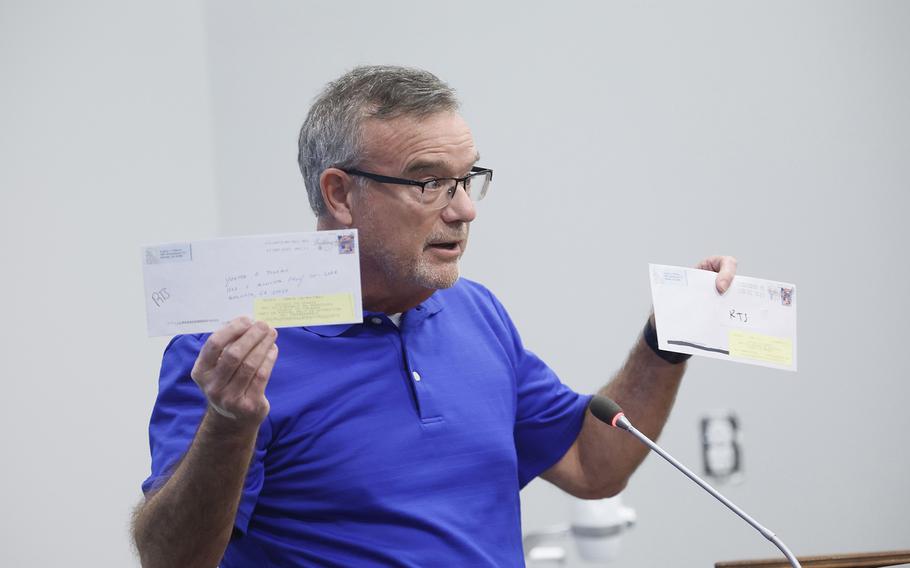
Cobb County, Georgia, resident Eugene Williams on Oct. 10, 2022, holds up envelopes he mailed to addresses that he says are invalid. (Natrice Miller/The Atlanta Journal-Constitution/TNS)
ATLANTA (Tribune News Service) — A federal judge ruled Tuesday in favor of the conservative group True the Vote, deciding that mass challenges of Georgia voters’ eligibility didn’t amount to illegal voter intimidation.
U.S. District Judge Steve Jones wrote in a 145-page order that there was insufficient evidence that True the Vote tried to threaten or coerce voters.
Jones’ ruling is a defeat for Fair Fight Action, the voting rights group founded by Democrat Stacey Abrams that was the lead plaintiff in the case.
Fair Fight alleged that True the Vote violated the Voting Rights Act when it coordinated roughly 250,000 challenges to voters’ eligibility before runoffs that decided control of the U.S. Senate in early 2021. County election boards rejected the vast majority of the voter challenges.
“Not only have plaintiffs failed to overcome the fact that their actions did not result in any direct voter contact or alone include or direct county boards of elections to pursue an eligibility inquiry, but there is no evidence that defendants’ actions caused (or attempted to cause) any voter to be intimidated, coerced, or threatened in voting,” Jones wrote.
An attorney for True the Vote, Jake Evans, praised the judge’s ruling after three years of litigation and a seven-day trial in October.
“This decision is monumental as it vindicates the defendants in totality and establishes that eligibility challenges ... are a proper method to ensure voter rolls are accurate,” said Evans, an unsuccessful Republican congressional candidate in 2022.
But Jones faulted True the Vote’s methods, which relied on huge spreadsheets that listed voters who had submitted change-of-address forms with the U.S. Postal Service.
Fair Fight argued that the challenges targeted eligible voters who wanted their mail forwarded but remained Georgia residents with full voting rights, including members of the military, students and relocated workers.
“TTV’s list utterly lacked reliability. Indeed, it verges on recklessness. The Court has heard no testimony and seen no evidence of any significant quality control efforts, or any expertise guiding the data process,” Jones wrote. “It is clear that TTV did not engage in a quality process to create the list, nor did they have proper review or controls in place.”
Still, Georgia law allows residents to file challenges against the eligibility of voters who they believe no longer live at the addresses where they’re registered. Under the law, county election boards must hold public hearings to decide on the challenge, which, if upheld, can lead to their ballots being rejected and their registrations canceled.
The legality of Georgia’s voter challenge law wasn’t part of the lawsuit. Instead, Fair Fight had sought to banish Texas-based True the Vote from operating in Georgia and from disputing voter eligibility in the future.
“Fair Fight is disappointed that Georgians and voters nationwide must continue to wait for our federal courts to impose accountability in the face of widespread and mounting voter intimidation efforts,” Fair Fight Executive Director Cianti Stewart-Reid said. “In recent years, we have witnessed the erosion of our rights unfold on a national level. And the courts do not consistently provide the vindication and protection we seek.”
Besides its work on voter challenges, True the Vote was also the organization behind the election conspiracy movie “2000 Mules,” which alleged widespread absentee ballot drop box fraud in the 2020 presidential election. State election investigators verified voters who were questioned in the film, and the State Election Board dismissed the case.
During the voter intimidation trial, witnesses testified about how they had to “jump through the hoops,” felt confused or wondered if they’d “get in trouble for voting.”
But there was no testimony that voters were contacted by True the Vote or heard of their press releases, according to Jones’ order.
After True the Vote challenged voters’ eligibility in the run-up to the 2021 U.S. Senate runoffs — won by Democrats Jon Ossoff and Raphael Warnock — the Republican-controlled Georgia General Assembly expanded the state’s voter challenge law, making it explicit that it could be used against an unlimited number of voter registrations.
Since then, conservative activists have filed over 100,000 more voter challenges, primarily in Atlanta-area counties with large numbers of Democratic voters.
Jones also rejected Fair Fight’s claims of intimidation related to True the Vote’s offer of “bounty” money and recruitment of Navy SEALS to monitor polling places.
Catherine Engelbrecht, the founder of True the Vote, testified that the bounty money was intended to compensate people who reported election fraud, and statements about Navy SEALs were meant to recruit volunteer election workers rather than to intimidate voters, according to Jones’ order.
Though Jones was appointed by Democratic President Barack Obama, he has ruled against Fair Fight and voting rights groups several times in recent years.
Jones upheld a Republican redistricting plan last week after the General Assembly redrew the state’s political map in response to a ruling that Georgia’s previous districts illegally weakened Black voting power.
And last year, Jones decided against against Fair Fight in its lawsuit from 2018 that opposed Georgia’s voting laws.
©2024 The Atlanta Journal-Constitution.
Visit at ajc.com
Distributed by Tribune Content Agency, LLC.